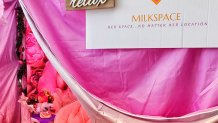A new bill is working its way through Congress which would help millions of nursing mothers across the country.
A Garland mom is also on her own mission to improve the lack of access to comfortable spaces accommodating breastfeeding women across North Texas.
Kelli Mumphrey said she saw such a disparity that she started her own pop-up business called MilkSpace.
“I founded MilkSpace in 2018 to be a service solution for outdoor areas where moms frequent, to make sure she has a space that meets her breastfeeding needs,” she said.
Get top local stories in DFW delivered to you every morning. Sign up for NBC DFW's News Headlines newsletter.

MilkSpace sets up a walk-in canopy tent complete with privacy, seating, power sources for moms to plug in their pumps and even a refrigerator to keep the milk cold on site.
Mumphrey’s goal is to bring more access to local businesses, events and nonprofits across the area.
Local
The latest news from around North Texas.
“We’re definitely lacking access to those services to meet women’s preferences as it relates to breastfeeding in open spaces. For those moms who have no qualms about breastfeeding or pumping in public, that is fantastic. But for a woman who desires a designated private clean and calm place, that’s hard to find,” she said.
She’s not alone in her mission to help other mothers. There’s a potential new law that could support more women in the workplace.
The U.S. House of Representatives recently passed the PUMP Act, which stands for Providing Urgent Maternal Protections for Nursing Mothers Act. It would extend workplace protections for nursing mothers to millions of workers.
The bill is supported by the White House and major business groups.
Currently, the next step is to clear the senate. If it passes there, it would require employers with 25 or more employees to provide time and private space for nursing mothers.
But Mumphrey says support for breastfeeding women should go beyond the office.
“I know there’s legislation that addresses workplace breastfeeding, but moms are not just at work. They're everywhere,” she said.
Mumphrey, a Navy veteran, said she's struggled through motherhood finding a quiet and private space to breastfeed in public, especially during her time in the military and while raising her children in DFW. She said she enjoyed going to parks with her family but struggled in finding comfortable areas to breastfeed while out and about.

That’s why she hopes her pop-ups and speaking out can begin the conversation toward more change on the local level.
“We must begin the conversation of what can be done… A collaborative approach as a community — beginning at the national level, filtering down to the state and local level,” she said. “Because while there is legislation that addresses workplace breastfeeding, legislation – House Bill 541 [passed in 2019] – that states women have the right to breast-feed and or pump wherever her presence is authorized to be. But that’s just words on paper. If we’re not taking the approach collectively as a community to ensure mothers have what they need to be empowered to exercise our breastfeeding rights, it’s kind of a disservice."
Making A Difference
Mumphrey's action to become a service to other mothers stems from her family's entrepreneurial spirit. Her grandfather owned the first Black-owned gas station in her hometown of Portsmouth, Virginia, followed by her father, mother and aunt each making a difference in their own businesses.
Her own business has worked several events across North Texas but Mumphrey said she hopes to bring her pop-up and educational opportunities to nonprofits, especially those supporting women of color.
"The data shows that disparities exist by race, predominantly in Black women," she said.
According to the Centers for Disease Control and Prevention, there’s a racial disparity among moms who breastfeed.
CDC data shows fewer Black infants are ever are ever breastfed compared to other racial groups:
- Black infants: 75.5%
- Asian infants: 92.4%
- White infants: 85.3%
- Hispanic infants: 85.0%
According to Black Mothers Breastfeeding Association, this gap in data is a catalyst in increasing awareness, not only to Black breastfeeding women but additional importance of Black maternal care as well.

You can read more about the data in the CDC’s annual Breastfeeding Report Card here.
Health experts attribute breastfeeding to lower instances of allergies, diseases, and cancers as those babies grow older -- which are health problems that Mumphrey says already disproportionately affect Black and Hispanic women.
“I do want to concentrate on communities that are underserved who may not have access to resources that women may have in other areas," Mumphrey said.
MilkSpace has a lot more information on its website.
For more resources, you can also visit the website for nonprofit Texas Breastfeeding Coalition, which has a program to help businesses support more breastfeeding mothers.



